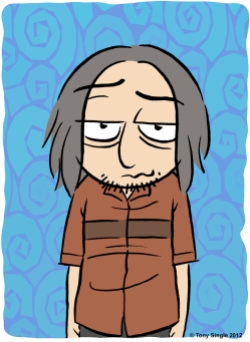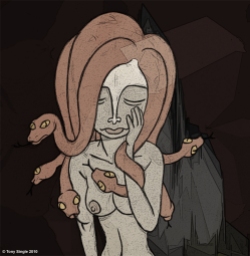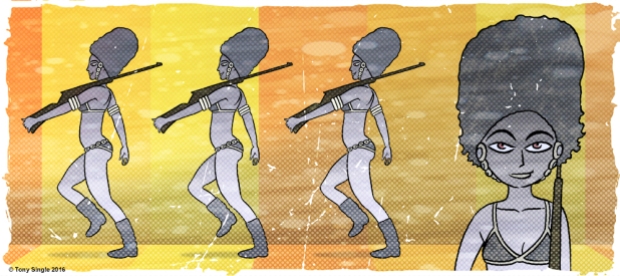Reblogged from; https://crumblecult.com/2017/05/21/comfy-confabs-tony-single/
Hullo, Dear Reader. Guess what? I got talked into being the second interviewee for my brand new, ongoing feature, Comfy Confabs. The interviewer being the interviewed?! How on Cthulhu’s sweet, barren earth did that happen? Well, I’ll tell you how… It’s all the fault of one Candice Daquin, and if you don’t know who she is then you really need to edjumacate yourself at The Feathered Sleep. Okay, go. Go now! Go and have your eyes opened and your mind exploded. I’m serious! I’ll be here when you get back.
Right, got all that? Good. So, anyways, I approached Candice to be the focus of this second interview, but instead of a yes I got an offer to be interviewed by her instead. “You’ll be more interesting!” she said. “But I’m a career hack!” I protested. She was having none of it, so I folded rather more easily than a deck chair at a conflict resolution symposium…
All joking aside, I am rather pleased with the outcome. Not only have I shared dialogue with a writer of Candice’s calibre, but the resulting Q&A even makes it seem like I’m not a total and utter narcissistic halfwit—pretentious maybe, and a bit of a tool, but still…
![]()
 CANDICE: Were you always an artist? Did you used to do something before that? If so, when did you decide to devote yourself more toward your art and networking your work for others to see?
CANDICE: Were you always an artist? Did you used to do something before that? If so, when did you decide to devote yourself more toward your art and networking your work for others to see?
TONY: I’ve been drawing since I could hold a crayon, so I feel like I’ve never not been an artist. I was even creating comic strips all the way through my school years, so by the time I was accepted into art college the idea of trying to be a professional cartoonist felt like the next logical step to me. However, my life since then has consisted of being equal parts job seeker, house husband, and struggling artist.
CANDICE: What do you recall as your original inspiration when you began to draw more for others to appreciate? What message if any did you want to convey the most?
TONY: I don’t really recall much to be honest. I do remember Charles Schulz’s Peanuts strip featuring quite prominently in my childhood. I adored its many characters (and still do), and very much aspired to do something in the same vein. As for messages, I don’t think I had any in mind at that age—only an idea that I wished to live out a creative life.
CANDICE: Do you consciously impart messages in your work or do you think they are interpreted by the viewer?
TONY: I believe it’s a bit of both. The older I get, the more I find what I want to say, and so I’ll layer this into whatever I create. However, no one likes to be preached at, so I’ll try to find an indirect way to impart that meaning, a way that gives the reader credit for having their own mind and take on things. Of course, whatever I put out there does often get interpreted in ways that I cannot possibly anticipate, but this is no bad thing. All it means is that people aren’t being passive, that they’re actively engaging with my work, and that makes me happy.
CANDICE: Does your hearing-loss factor in the choices you make artistically?
TONY: Such an interesting question. No one has ever asked me this before! If my hearing-loss is any factor at all then it would have to be in the way I try to write dialogue. I am constantly striving to make my characters sound as naturalistic as possible (not easy to do within the silence of the page). I want their stresses, intonations, and turns of phrase to mimic what I will often hear in everyday conversations.
CANDICE: When did you begin to combine your ability as a writer/poet with your art? Do you feel more confident in one genre than another?
TONY: As a cartoonist, I’ve always combined my writing with my art. I do find it difficult to draw a standalone image as it often feels like there’s no story present. I tend to be more comfortable working with a sequence of images; it’s a less static approach that’s conducive to driving narrative or some overall message. If there’s one thing I like more than writing or drawing alone, it’s putting those two things together to tell a story.
 CANDICE: If you had endless options, what would you choose to do with your art? Would you like to be a comic-artist, a graphic-novelist? Or something else?
CANDICE: If you had endless options, what would you choose to do with your art? Would you like to be a comic-artist, a graphic-novelist? Or something else?
TONY: When I was young, my goal was to write and draw a famous comic strip, just like my hero Charles Schulz. That changed. What I’m doing now with Crumble Cult actually plays to my strengths as a cartoonist, and far more so than the newspaper format ever would have. It’s emotionally fulfilling in a way that a gag strip could never be for me. Still, as a creative, I can’t say that I’ve ‘arrived’. My next big challenge is to write and draw my first graphic novel, and I want to do this in Ukraine. I have no idea how I can make this happen, but I sure aim to.
CANDICE: If you weren’t you and you didn’t know you, and you saw your art what would you think of the person behind it?
TONY: God. Again with the interesting questions! I find this difficult to answer as I’m often wondering what people make of me anyway (could someone tell me?). I’m constantly striving to get personal with my comics, to bare my all, and yet I use them to hide myself at the same time. It’s weird, I know. I guess I just like to confound people’s expectations.
CANDICE: Whom are your biggest influences both historically and in more recent times and why?
TONY: There’s the aforementioned Mr. Schulz. His Peanuts strip has always appealed to my whimsical and melancholic natures, as have the works of Tove Jansson. I grew up reading her Moomintroll books, and they were fanciful but in an extraordinarily mundane, grounded way. Then there was the Osamu Tezuka comics that possessed a certain kineticism which I very much admired. And they had a rather pleasing pulp fiction sensibility too; for me, Adolf and Astroboy will always be his definitive works. Oh, and Rumiko Takahashi’s Maison Ikkoku was another influence. That story was romantic, down-to-earth, very very funny, and humane. I’m also seeing an abundance of that last quality in Love and Rockets by the Hernandez Bros. That’s a more recent influence I suppose, but no way in hell will I ever reach those giddy heights of masterful storytelling. Not with my own paltry efforts. Still, I love what I do, so I can try.
CANDICE: You mentioned wanting to do a graphic novel (so glad you said that, this interviewer always felt this was your destiny, jus sayin’!) but also ‘in Ukraine’ meaning you want to write / draw it in Ukraine or in Ukrainian? Can you elaborate on this and explain to the readers where this momentum began and why? (I think I know!)
TONY: I think you do too! I once asked my writing partner Tetiana Aleksina about her home country, and she challenged me to simply go there and pay her a visit. Her feeling was that it would be better for me to experience Ukraine firsthand rather than simply hear about it from afar. That’s when I had the idea to turn this potential trip into a story that I could tell in the graphic novel format, and so I’ve been obsessed with the idea ever since. Plus, it would just be a cool thing to hang out with someone that I love and admire very much! I plan to make it happen. Again, I don’t know how, but I will.
 CANDICE: What influence has your writing collaborator Tetiana Aleksina had on your work and how do you feel she has influenced your direction?
CANDICE: What influence has your writing collaborator Tetiana Aleksina had on your work and how do you feel she has influenced your direction?
TONY: I was floundering creatively before Tati came along, and that’s the truth. I don’t know where I’d be today if it weren’t for her timely intervention. The width and breadth of her imagination is the one thing that shone through when I first encountered her blog, and so I very quickly became a fan. And as I got to know Tati through our collaborations thereafter, I came to realise she was someone I very much wanted to work with on a permanent basis. With much trepidation, I asked her if I could, and luckily for me she said yes! And in all the time since, I’ve come to see just how meticulous Tati is with her endeavours. Everything counts for her; nothing gets wasted. Things are worth doing properly or not at all. Not many bloggers seem to have this perfectionist drive, and so I’ve really come to value her professional approach and attention to detail. I’m forced to lift my game—to strive for my absolute best—and this clearly is no bad thing. As a result, we now have many projects in the pipeline, and aim to make them all come to fruition.
CANDICE: If you could fast-forward ten years where would you like to be in terms of creative output and accomplishment?
TONY: I would like my wife and I to be living abroad, and for me to be working alongside Tati in person. That’s the dream. We want to bring out more books, to complete our first novel, and maybe even tackle a graphic novel together too. The sky’s the limit. We just have to be foolish enough to reach for it!
CANDICE: What subjects most influence your perspective as an artist and why?
TONY: Religion and mental health are two huge subjects in my life, so they tend to crop up in my work a lot. After suffocating in a Baptist church environment for nearly twenty years, I realised that I needed to get out and truly be myself for once. I’d also given up on the idea of a loving god by this point, and was feeling tremendous guilt about that—I felt like a heretic and a failure as a human being. There were also lingering questions from my youth regarding my sexuality and self-identity that were still not going away, that could not be adequately addressed the longer I stayed in such an emotionally and intellectually toxic subculture. I felt stained and stunted. I needed to escape. Add ongoing anxiety and depression to the mix, and you can see why I write and draw the things I do. I have to.
CANDICE: What role do you think you play as an artist in terms of being a ‘truth’ bearer to subjects most close to your heart and what subjects would you include? (Example; This interviewer holds mental-health and gender close to her heart and incorporates them into her work often.)
TONY: The more I follow my current path, the more I find what I want to explore in terms of themes. Of course, there’s the aforementioned religious and mental health issues, but I’m now branching out into other areas such as sexual identity and gender politics, and finding that there’s quite a bit of crossover. Actually, it’s shocking to note just how much church and society have framed my thinking in general, and in ways that are less than helpful, that quite frankly fly in the face of reality. Back in my church days I tried to cleave to some pretty dangerous ideas dressed up as piousness and a sacrificial love for mankind, but really… I was only robbing myself of the ability to empathise with others while at the same time deliberately taking leave of my senses. One particular issue seemed to crop up again and again amongst my peers: homosexuality. God and his ‘chosen ones’ were disturbingly obsessed with that, and sought to box it up as something which was ‘aberrant’ and ‘evil’. This kind of bigotry always troubled me as I’d always believed that homosexuals were as normal as anyone, but I never had the guts to challenge it head on. At the time, I was more invested in gaining total acceptance from my fellow Christians than in pursuing a form of ethical honesty. So, yes, I now incorporate such concerns and themes into my works as often as possible. It’s kind of my duty, and I have a lot to atone for.
CANDICE: Thank you for your time answering these questions. As long as I have had the fortune to know you as an artist, I have found you to be a continual inspiration, but I also know you personally to be very modest and unaware of the impact you have upon others. Do you think this came about from your life thus far? Have you felt working in this creative community and especially with your creative partner Tati, that you have begun to shed your modesty and become fully the creative person you wanted to be? Do you see this as a process of transformation? I say this because in the last year I see a shift in the courage of your work delving deeper into issues and subjects that matter to you with more willingness to ‘go there’ than say, before.
TONY: Oh, Candice, you’ve always been very kind to me. I wish I truly was modest. The reality is that I possess a massive ego, and it offends me. Seriously, I must have an overinflated sense of self to be trying to tear that down on a constant basis! If I was truly humble, I wouldn’t even be thinking about myself in the first place. As for the impact I have on others, I’m always worried that it will be a bad one, so I find I overcompensate and try not to have an impact at all. I know—messed up or what? I always suspect that I’m not being totally honest with myself, which is why I write and draw. I just want to get closer to the truth of me—whatever that may be—so the creative process is very much an act of attempted transformation. It’s taken me a long time to ‘go there’, to work up the courage (or foolishness?) to tackle issues and subjects that I personally still find very painful. I also hope I don’t end up fashioning a narrative for my life that isn’t honest, or a narrative that paints me as some blameless, long-suffering saint. A narrative that fools even me. How do you stay true to something like that? I’ve no idea.
Please visit Tony at;https://crumblecult.com/2017/05/21/comfy-confabs-tony-single/ and please leave comments on his site♡
